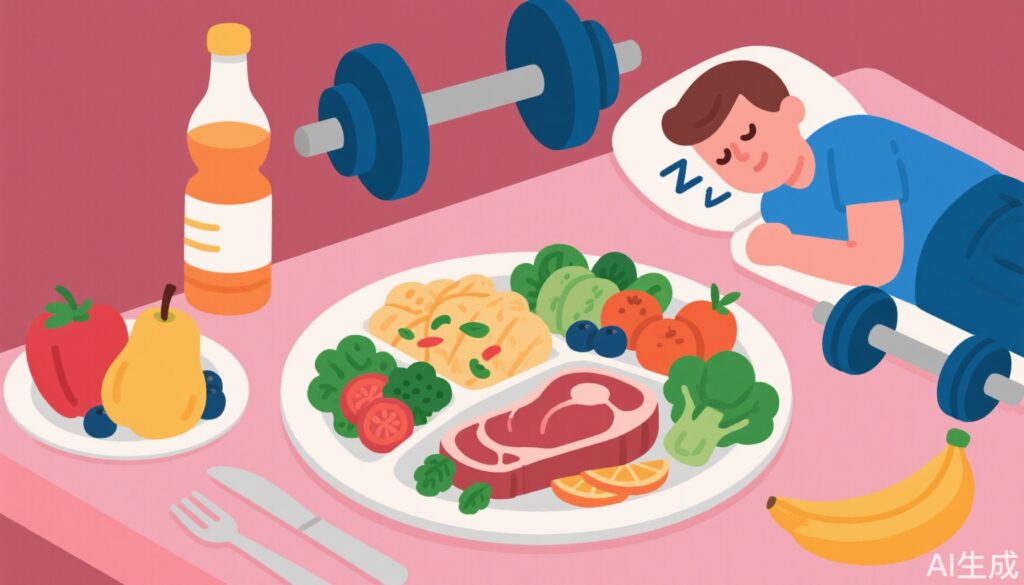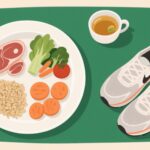Eat Moderate Amounts of “Meat”
Contrary to popular belief, eating some meat during weight loss is not a taboo. Meat provides high-quality protein, iron (especially in red meats), vitamin B12, and other nutrients that are scarce or less bioavailable in plant-based foods. The body expends significantly more energy digesting protein—about 15% to 25% more than digesting the same amount of carbohydrates and 15% to 30% more than digesting fats. Additionally, meat digestion takes longer, providing prolonged satiety and stabilizing appetite.
Protein is a primary building block of muscle tissue. Long-term insufficient intake of quality protein can lead to muscle loss, which in turn lowers the basal metabolic rate (BMR). Maintaining a high-protein diet during weight loss can help reduce muscle loss and improve weight loss outcomes.
Key Recommendations:
- Balance white and red meat intake, focusing more on lean white meats such as fish, shrimp, and chicken.
- Choose lightly processed and mild cooking methods like boiling or cold dishes to avoid excess oil and salt, which can increase fat and calorie intake.
- Pair meat with vegetables, fruits, and whole grains to supplement dietary fiber, vitamins, and antioxidants while preventing excessive calorie intake from meat.
Eat Appropriate Amounts of Healthy “Snacks”
Craving snacks is not necessarily bad. Choosing healthy snacks at appropriate times can help regulate blood sugar and lipids and won’t cause weight gain. Healthy snacks include fresh fruits and vegetables, small portions of unsweetened whole grains, and are especially suitable for between meals.
Low-sugar or sugar-free dairy products such as yogurt and natural cheese are excellent choices as they are rich in protein, calcium, and probiotics that promote gut health. Low-salt and low-fat chicken or beef jerky provide quality protein, enhance satiety, and help control appetite.
Key Recommendations:
- Plan snacks alongside main meals to avoid treating snacks as extra calories. Snacks help control portion sizes during subsequent meals and can allow for smaller meal sizes.
- Eat snacks about 30 minutes before meals to maximize their health and weight loss benefits; avoid or minimize snacks after meals, especially before bedtime.
- Control snack portions carefully and do not substitute snacks for meals. For reference: an apple-sized portion of fruit, a small cup of yogurt, a handful of nuts (in shell), or two average-sized beef jerky sticks.
Avoid Strict Carbohydrate Elimination
Many people believe that eliminating all carbohydrates is essential for weight loss, but strict carb avoidance is often unsustainable and leads to intense cravings, resulting in weight loss failure. In reality, appropriate carbohydrate intake—especially from whole grains and coarse grains—does not cause weight gain. Instead, it helps maintain stable appetite, prevents binge eating, provides energy, prevents muscle breakdown, and supports basal metabolism. Additionally, strict carb elimination may accelerate aging and increase diabetes risk.
Key Recommendations:
- Choose minimally processed carbohydrates to retain dietary fiber, minerals, and nutrients and reduce intake of added sugars, fats, and salt. For example, steamed sweet potatoes are less processed than caramelized sweet potatoes; boiled corn is less processed than popcorn.
Drink Tea or Low-Calorie Coffee
Some believe all beverages should be avoided during weight loss, but drinking tea or unsweetened/low-sugar, non-creamy low-calorie coffee can enhance weight loss and offer other health benefits. Research shows caffeine improves exercise performance, making workouts easier and longer, thus increasing energy expenditure.
Key Recommendations:
- Avoid adding sugar; if flavoring is necessary, add milk.
- Choose the right timing, ideally 30 minutes to an hour before meals, and avoid large quantities before sleep to prevent caffeine from disturbing sleep quality.
- Adjust intake according to gastrointestinal tolerance; if discomfort occurs, reduce or stop consumption.
Prioritize Enough Sleep
Though it may seem counterintuitive, loving sleep can enhance weight loss. Sleep deprivation is a recognized risk factor for obesity because it disrupts hormones that regulate appetite, causing overeating. Conversely, adequate sleep promotes secretion of insulin-like growth factor, which supports muscle growth and maintains a higher basal metabolic rate. Studies have shown that individuals with sufficient sleep lose more fat and preserve more muscle compared to those who are sleep-deprived, even when losing the same weight.
Key Recommendations:
- Maintain both regularity and adequate duration of sleep. Do not compensate for lost sleep by oversleeping the next day, as this disrupts hormone regulation and weight loss.
- Avoid excessively long sleep periods that may cause intense hunger and unselective overeating, which harms weight loss and disrupts sleep rhythms.
- Choose low-sugar, low-fat, and low-salt foods after waking.
Eat Immediately After Exercise
Eating right after exercise might seem like it undermines workout benefits, but it is actually crucial. Quickly replenishing carbohydrates and high-quality protein after exercise prevents protein breakdown caused by delayed energy intake, maintaining muscle mass and basal metabolism. Additionally, eating post-exercise stabilizes appetite and blood sugar, preventing hypoglycemia and subsequent binge eating.
It is important to select appropriate post-exercise foods. Quick-digesting carbohydrates such as steamed buns, low-sugar/unsweetened and low-fat bread or crackers are good for energy replenishment. Low-salt, lean protein sources like chicken breast, shrimp, or boiled eggs promote muscle repair and growth. To further enhance weight loss, you can substitute with corn or whole grain rice balls.
Key Recommendations:
- Plan your post-exercise meal as part of your overall daily meal plan; reduce intake in subsequent meals to avoid significantly increasing total calorie intake.
- Avoid overeating immediately after exercise, which can cause gastrointestinal discomfort and reactive hypoglycemia (a rapid blood sugar rise followed by a drop), leading to dizziness and fatigue.



